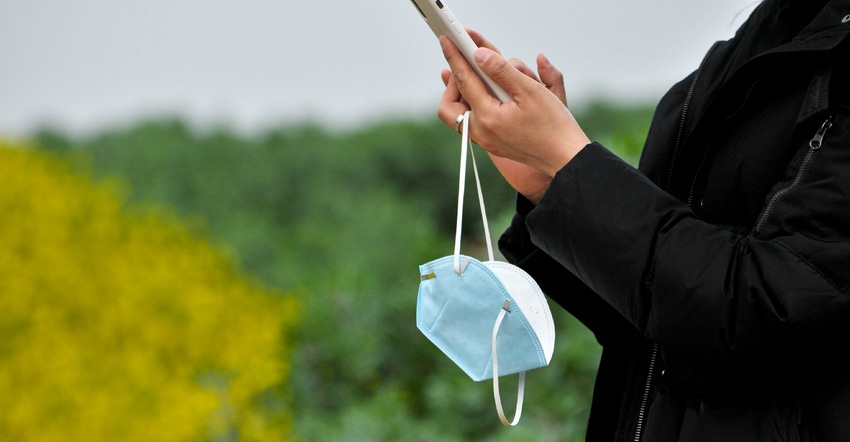January 25, 2021

Every day, farmers and ranchers face a lot of decisions. Some decisions are easy while others require research and outreach to experts to make an informed decision. These decisions can range from livestock genetics, feed, seed technology, and when and where to market our finished product.
The experts we rely on in agriculture such as veterinarians, nutritionists, marketing advisers and agronomists play an important role in helping us find the right solution for our farms and ranches.
After living through nearly a year of the COVID-19 pandemic, I think there’s a lot the medical community can relate to in agriculture. Looking back, there are many ways the COVID-19 response has been borrowing from the livestock biosecurity playbook.
Many of the decisions farmers make concerning the health of their livestock are similar to the decisions health care workers across the country are making for their communities right now.
Safety for farm, home
When I read various safety protocols proposed by local, state and federal partners, they remind me of the protocols used in the livestock industry today. That’s because in a very similar way, our family’s hog farm has been using these measures as biosecurity standards for years.
Our farm has a biosecurity plan to prevent the outbreaks of disease, and a plan for our response if a disease ever hits our herd. Part of that plan includes biosecurity maps that limit the contact that our hogs have with other parts of the barn when we move them around.
If a sow becomes ill, we can isolate her from the rest of the herd. We also make sure that we’re practicing good hygiene by keeping clean shoes in each barn, disinfecting equipment and showering in and out of our barns.
An integral part of our operation is the expertise that comes from the veterinarians we work with. They are professionals trained in the field of animal health, and while our family knows a great deal about animal health after spending our whole lives as farmers, we rely on our herd veterinarian to stay up on the latest advancements in animal health. If our veterinarian tells us to do something for our herd, we do it.
Doctors are doing the same thing in America right now. While nobody knows their body better than themselves, most of us don’t have the years of medical experience and training doctors and health professionals do.
It was 19 years ago that our son, Conner, was born. Kevin and I already had one child together, and our daughter had already decided that she’d like to be a nurse one day. It’s amazing what having kids can make you aware of.
One of those lessons learned for us very early on was the importance of protecting your children when they are vulnerable. Our pediatrician recommended strongly that we get vaccinated for the flu. We trusted him and have gotten our flu shots consistently for 19 years in a row.
If a disease outbreak would occur that is deadly to our herd, we use whatever vaccination precautions are necessary to save our animals. Even animals that aren’t sick may need to be vaccinated to ensure the health of the whole herd. That’s very similar to how I view the COVID-19 vaccine.
Trust, but verify
With infection and death rates much higher in our vulnerable population than many of our common illnesses, it’s so important that we each do our part to protect the health of the whole “herd.”
In this case, your herd is your family, your neighbors, your co-workers and your community. You may not be sick, but a vaccine can help protect the health of those around you.
We trust our veterinarian every day to give us sound advice for our operation, as many farmers and ranchers do. If you trust your veterinarian to recommend vaccinations to your herd and practices to protect your herd’s health, then you should trust the advice that your doctor is giving you too.
There’s a lot of misinformation circulating online about the COVID-19 vaccine. I’ve seen it too, and the claims I see are generally very concerning until I am able to use my understanding of animal health to research them further.
There is no tracking device or DNA-altering technology. The vaccine will not sterilize humans. These are just a few of the rumors that I’ve seen created and spread through social media fears.
Gov. Mike Parson and the cabinet team have developed a website so you can get the facts about this vaccine, verified by his administration and infectious disease experts in Missouri. You can view the site by visiting MOStopsCOVID.com.
I encourage you to ask critical questions and consult with medical professionals to get reliable information about the COVID-19 vaccine. It’s critical that our communities know the impact this breakthrough science can have on our health.
For years, we have implemented the best practices for our herd and our family to keep them both safe. I will put into practice that same diligence when it comes to protecting the health of those around me. This means preventing the spread of COVID-19 by using the best science and vaccines that are available.
Chinn is the director of the Missouri Department of Agriculture and a hog producer from Clarence, Mo.
Read more about:
Covid 19About the Author(s)
You May Also Like




